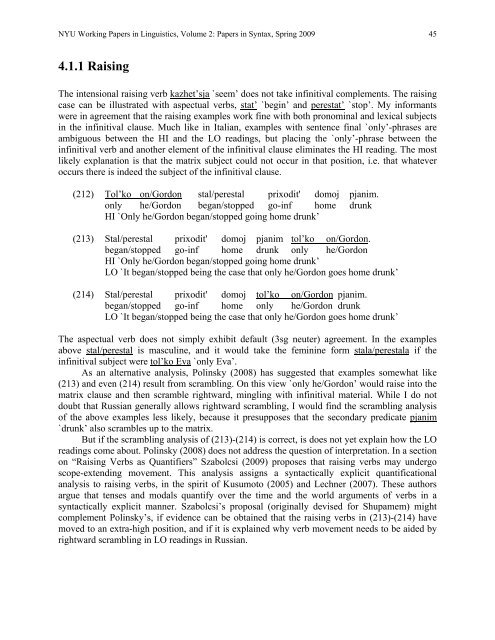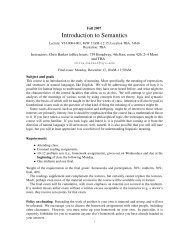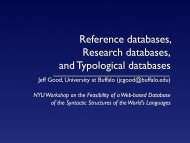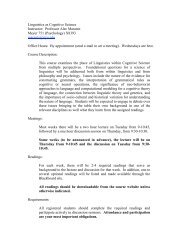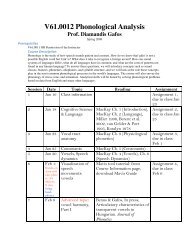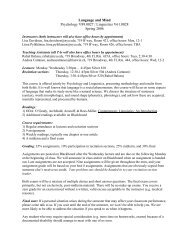<strong>NYU</strong> Work<strong>in</strong>g Papers <strong>in</strong> L<strong>in</strong>guistics, Volume 2: Papers <strong>in</strong> Syntax, Spr<strong>in</strong>g 2009 44(210) *Sadece o iyi rolleri sadece o almak istemedi(211) Sadece o iyi rolleri sadece kendisi almak istemedi.LO: `Only he doesn't want to be the only one who gets the good roles”3.6.4 Summary of the Turkish dataTurkish exhibits LO read<strong>in</strong>gs <strong>in</strong> both rais<strong>in</strong>g and control constructions. The matrix versuscomplement position of the nom<strong>in</strong>ative DPs is not easy to determ<strong>in</strong>e <strong>in</strong> a strict SOV language, soit may be that we are deal<strong>in</strong>g with a pure scope phenomenon. But the fact that lexical DPs arepossible <strong>in</strong> LO read<strong>in</strong>gs <strong>in</strong> rais<strong>in</strong>g but, crucially, not <strong>in</strong> control constructions may <strong>in</strong>dicate thatthe LO read<strong>in</strong>gs <strong>in</strong>deed <strong>in</strong>volve <strong>in</strong>f<strong>in</strong>itival subjects. The negative concord data would then lendfurther support to this analysis. The fact that some speakers judge o, as opposed to kendisi, to bebad <strong>in</strong> some LO read<strong>in</strong>gs requires further thought. As of date I have no data on pronom<strong>in</strong>aldoubles.3.7 Summary of section 3 and transition to section 4This section surveyed data from Italian, Spanish, Portuguese, Romanian, Hebrew, and Turkish.What these languages have <strong>in</strong> common is that LO read<strong>in</strong>gs are available <strong>in</strong> both rais<strong>in</strong>g andcontrol constructions, and <strong>in</strong> control constructions a Condition C effect occurs with lexical DPs,mak<strong>in</strong>g pronouns the only option as overt <strong>in</strong>f<strong>in</strong>itival subjects. These languages differ as to theevidence show<strong>in</strong>g that these pronouns are <strong>in</strong>deed subjects, as opposed to pronom<strong>in</strong>al doubles ofPRO (recall though that Mensch<strong>in</strong>g (2000) essentially wants to reduce pronom<strong>in</strong>al doubles toPRO). Given the availability of the noi l<strong>in</strong>guisti `we l<strong>in</strong>guists’ construction, Italian offers ratherclear evidence that our pronouns can be subjects. Recall also that not all Italian varieties havepronom<strong>in</strong>al doubles <strong>in</strong> mono-clausal examples, and <strong>in</strong> this respect these varieties are likeHungarian, discussed <strong>in</strong> section 2: the pronom<strong>in</strong>al-double confound does not exist. The otherlanguages of section 3 only allow the `we the l<strong>in</strong>guist’ construction, which is unfortunately notdiagnostic. It is to be hoped that future research will f<strong>in</strong>d alternative diagnostics, and thecurrently open analytical questions can be settled.The languages <strong>in</strong> section 4 differ from the above <strong>in</strong> that the LO read<strong>in</strong>g is not expressible<strong>in</strong> control contexts us<strong>in</strong>g potentially complement-<strong>in</strong>ternal nom<strong>in</strong>ative DPs. The analyses will befar from def<strong>in</strong>itive, <strong>in</strong> some cases due to limitations on field work. The data are <strong>in</strong>cluded topromote further research. A more def<strong>in</strong>itive analysis of these languages should shed light onwhether it is possible for overt subjects to occur <strong>in</strong> rais<strong>in</strong>g complements only, or only languagesthat also have overt subjects <strong>in</strong> control complements have them <strong>in</strong> rais<strong>in</strong>g contexts.4 Languages with overt <strong>in</strong>f<strong>in</strong>itival subjects at most <strong>in</strong> rais<strong>in</strong>gcomplements: Russian, F<strong>in</strong>nish, Shupamem, and NorthernNorwegian4.1 Russian (thanks to Maria Gouskova, Inna Livitz, Stephanie Harves, Maria Pol<strong>in</strong>sky, IgorYanovich, and Anna Kovtunova for data and discussion)
<strong>NYU</strong> Work<strong>in</strong>g Papers <strong>in</strong> L<strong>in</strong>guistics, Volume 2: Papers <strong>in</strong> Syntax, Spr<strong>in</strong>g 2009 454.1.1 Rais<strong>in</strong>gThe <strong>in</strong>tensional rais<strong>in</strong>g verb kazhet’sja `seem’ does not take <strong>in</strong>f<strong>in</strong>itival complements. The rais<strong>in</strong>gcase can be illustrated with aspectual verbs, stat’ `beg<strong>in</strong>’ and perestat’ `stop’. My <strong>in</strong>formantswere <strong>in</strong> agreement that the rais<strong>in</strong>g examples work f<strong>in</strong>e with both pronom<strong>in</strong>al and lexical subjects<strong>in</strong> the <strong>in</strong>f<strong>in</strong>itival clause. Much like <strong>in</strong> Italian, examples with sentence f<strong>in</strong>al `only’-phrases areambiguous between the HI and the LO read<strong>in</strong>gs, but plac<strong>in</strong>g the `only’-phrase between the<strong>in</strong>f<strong>in</strong>itival verb and another element of the <strong>in</strong>f<strong>in</strong>itival clause elim<strong>in</strong>ates the HI read<strong>in</strong>g. The mostlikely explanation is that the matrix subject could not occur <strong>in</strong> that position, i.e. that whateveroccurs there is <strong>in</strong>deed the subject of the <strong>in</strong>f<strong>in</strong>itival clause.(212) Tol’ko on/Gordon stal/perestal prixodit' domoj pjanim.only he/Gordon began/stopped go-<strong>in</strong>f home drunkHI `Only he/Gordon began/stopped go<strong>in</strong>g home drunk’(213) Stal/perestal prixodit' domoj pjanim tol’ko on/Gordon.began/stopped go-<strong>in</strong>f home drunk only he/GordonHI `Only he/Gordon began/stopped go<strong>in</strong>g home drunk’LO `It began/stopped be<strong>in</strong>g the case that only he/Gordon goes home drunk’(214) Stal/perestal prixodit' domoj tol’ko on/Gordon pjanim.began/stopped go-<strong>in</strong>f home only he/Gordon drunkLO `It began/stopped be<strong>in</strong>g the case that only he/Gordon goes home drunk’The aspectual verb does not simply exhibit default (3sg neuter) agreement. In the examplesabove stal/perestal is mascul<strong>in</strong>e, and it would take the fem<strong>in</strong><strong>in</strong>e form stala/perestala if the<strong>in</strong>f<strong>in</strong>itival subject were tol’ko Eva `only Eva’.As an alternative analysis, Pol<strong>in</strong>sky (2008) has suggested that examples somewhat like(213) and even (214) result from scrambl<strong>in</strong>g. On this view `only he/Gordon’ would raise <strong>in</strong>to thematrix clause and then scramble rightward, m<strong>in</strong>gl<strong>in</strong>g with <strong>in</strong>f<strong>in</strong>itival material. While I do notdoubt that Russian generally allows rightward scrambl<strong>in</strong>g, I would f<strong>in</strong>d the scrambl<strong>in</strong>g analysisof the above examples less likely, because it presupposes that the secondary predicate pjanim`drunk’ also scrambles up to the matrix.But if the scrambl<strong>in</strong>g analysis of (213)-(214) is correct, is does not yet expla<strong>in</strong> how the LOread<strong>in</strong>gs come about. Pol<strong>in</strong>sky (2008) does not address the question of <strong>in</strong>terpretation. In a sectionon “Rais<strong>in</strong>g Verbs as Quantifiers” Szabolcsi (2009) proposes that rais<strong>in</strong>g verbs may undergoscope-extend<strong>in</strong>g movement. This analysis assigns a syntactically explicit quantificationalanalysis to rais<strong>in</strong>g verbs, <strong>in</strong> the spirit of Kusumoto (2005) and Lechner (2007). These authorsargue that tenses and modals quantify over the time and the world arguments of verbs <strong>in</strong> asyntactically explicit manner. Szabolcsi’s proposal (orig<strong>in</strong>ally devised for Shupamem) mightcomplement Pol<strong>in</strong>sky’s, if evidence can be obta<strong>in</strong>ed that the rais<strong>in</strong>g verbs <strong>in</strong> (213)-(214) havemoved to an extra-high position, and if it is expla<strong>in</strong>ed why verb movement needs to be aided byrightward scrambl<strong>in</strong>g <strong>in</strong> LO read<strong>in</strong>gs <strong>in</strong> Russian.
- Page 1: Overt Nominative Subjects in Infini
- Page 4 and 5: NYU Working Papers in Linguistics,
- Page 6 and 7: NYU Working Papers in Linguistics,
- Page 8 and 9: NYU Working Papers in Linguistics,
- Page 10: NYU Working Papers in Linguistics,
- Page 13 and 14: NYU Working Papers in Linguistics,
- Page 15 and 16: NYU Working Papers in Linguistics,
- Page 18 and 19: NYU Working Papers in Linguistics,
- Page 20 and 21: NYU Working Papers in Linguistics,
- Page 22 and 23: NYU Working Papers in Linguistics,
- Page 24 and 25: NYU Working Papers in Linguistics,
- Page 26 and 27: NYU Working Papers in Linguistics,
- Page 28 and 29: NYU Working Papers in Linguistics,
- Page 30 and 31: NYU Working Papers in Linguistics,
- Page 32 and 33: NYU Working Papers in Linguistics,
- Page 35 and 36: NYU Working Papers in Linguistics,
- Page 37 and 38: NYU Working Papers in Linguistics,
- Page 39 and 40: NYU Working Papers in Linguistics,
- Page 41 and 42: NYU Working Papers in Linguistics,
- Page 43: NYU Working Papers in Linguistics,
- Page 47 and 48: NYU Working Papers in Linguistics,
- Page 49 and 50: NYU Working Papers in Linguistics,
- Page 51 and 52: NYU Working Papers in Linguistics,
- Page 53 and 54: NYU Working Papers in Linguistics,
- Page 55: NYU Working Papers in Linguistics,


